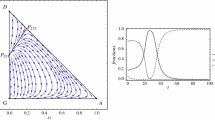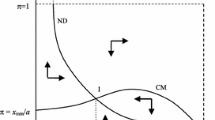Abstract
In the evolutionary approach to the repeated prisoner's dilemma, strategies spread in populations of emulating and experimenting agents through the principle of survival of the fittest. Although no pure strategy is evolutionarily stable in such populations, the processes of differential strategy propagation provide a promising area of study. This paper employs computer simulations to uncover how these processes govern the oscillating and open-ended evolution of alternative forms of behaviour. Certain `ecological' relationships between important strategy types which are found to be responsible for these behavioural shifts are explored.
Similar content being viewed by others
REFERENCES
Axelrod, R. (1984), The Evolution of Cooperation. Basic Books, New York.
Axelrod, R. (1987), The evolution of strategies in the iterated prisoner's dilemma. In L. Davis, editor, Genetic Algorithms and Simulating Annealing, pages 32-41, Pitman, London, UK.
Binmore, K. and Samuelson, L. (1992), Evolutionary stability in games played by finite automata, Journal of Economic Theory 57: 278-305.
Boyd, R. (1989), Mistakes allow evolutionary stability in the repeated prisoner's dilemma game, Journal of Theoretical Biology 136: 47-56.
Boyd, R. and Lorberbaum, J.P. (1987), No pure strategy is evolutionarily stable in the repeated prisoner's dilemma game, Nature 327: 58-59.
Farrell, J. and Ware, R. (1989), Evolutionary stability in the repeated prisoner's dilemma, Theoretical Population Biology 36: 161-166.
Fogel, D.B. (1993), Evolving behaviors in the iterated prisoner's dilemma, Evolutionary Computation 1: 77-97.
Hirshleifer, J. and Martinez Coll, J.C. (1988), What strategies can support the evolutionary emergence of cooperation? Journal of Conflict Resolution 32: 367-398.
Hoffmann, J.R. (1996), The evolution of cooperation revisited. Discussion Paper 1996.VI, University of Nottingham Business School, Nottingham, UK.
Hoffmann, R. (1999), The independent localisations of interaction and learning in the repeated prisoner's dilemma, Theory and Decision 47: 57-72.
Holland, J.H. (1992), Genetic algorithms, Scientific American, July 1992: 44-50.
Lindgren, K. (1992), Evolutionary phenomena in simple dynamics. In C.G. Langton, editor, Artificial Life II. Addison-Wesley, Reading, MA.
Linster, B.G. (1992), Evolutionary stability in the infinitely repeated prisoner's dilemma played by two-state moore machines, Southern Economic Journal 58: 880-903.
Lomborg, B. (1996), Nucleus and shield: The evolution of social structure in the repeated prisoner's dilemma, American Sociological Review 61: 278-307.
Maynard Smith, J. (1982), Evolution and the Theory of Games. Cambridge University Press, Cambridge, UK.
Miller, J.H. (1988), The evolution of automata in the repeated prisoner's dilemma. In J.H. Miller (ed.), Two Essays on the Economics of Imperfect Information. University of Michigan, Ph.D. dissertation.
Miller, J.H. (1996), The coevolution of automata in the repeated prisoner's dilemma, Journal of Economic Behavior and Organization 29: 87-112.
Nachbar, J.H. (1992), Evolution in the finitely repeated prisoner's dilemma, Journal of Economic Behavior and Organization 19: 307-326.
Nowak, M. and May, R. (1992), Evolutionary games and spatial chaos, Nature 359: 826-829.
Simon, H.A. (1981), The Sciences of the Artificial. MIT Press, Cambridge,MA.
Sugden, R. (1986), The Economics of Cooperation, Rights and Welfare. Basil Blackwell, Oxford, UK, 1986.
Author information
Authors and Affiliations
Corresponding author
Rights and permissions
About this article
Cite this article
Hoffmann, R. The Ecology of Cooperation. Theory and Decision 50, 101–118 (2001). https://doi.org/10.1023/A:1010353814597
Issue Date:
DOI: https://doi.org/10.1023/A:1010353814597




